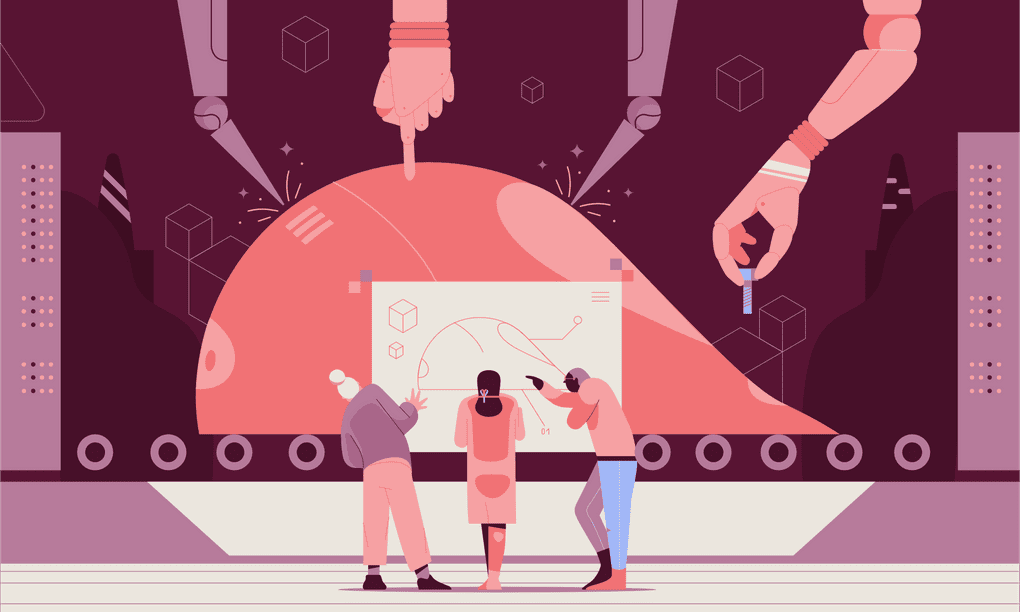Why a robot won’t take your job – but it may well share it.

It’s time for the scaremongering to stop – automation could mean net job gains, new employment opportunities and a potential future of great wealth


We hear a lot of scare stories about automation, particularly when it comes to the workplace. Barely a week goes by without someone claiming we’re all going to being replaced by robots, with automation making us redundant by the millions. It’s easy to see why we – as employees and as businesses – would panic.
But, in truth, artificial intelligence (AI) in the workplace is more of a nuanced topic.
“AI tends to suffer from quite a polarized narrative,” says Rob McCargow, director of AI at PwC, a professional services consultancy. “On the one hand, it has been somewhat over-hyped in recent years as a magical technology, which overstates its current level of maturity. On the other hand, the dystopian view of AI receives much more traction than it deserves.”
McCargow admits that there are some “very genuine concerns about the negative impact that AI” could have on society, but he’s keen to stress that by focusing on dystopian scenarios we risk missing the positive benefits that it could bring.
So, what do the experts think? In one report (pdf), Future Advocacy, a thinktank, estimates that about 30% of jobs in the UK are at risk of automation by the early 2030s. Deloitte found in 2017 that 20% of HR and business leaders were going to reduce the number of jobs at their companies because of AI. At first glance, things don’t look entirely positive.
“The economy is going to be hit by wave after wave of automation over the coming years,” says Olly Buston, CEO at Future Advocacy. “Economists of all persuasions more or less agree on this.”
What economists disagree on, though, is how many new jobs will be created to replace those that are going to be lost. A recent report by the World Economic Forum suggested that while robots will displace 75m jobs globally in the next 10 years, 133m new jobs could be created because of automation. Similarly, the McKinsey Global Institute reckons that although between 400m and 800m jobs are at risk, advances in AI and automation could transform our working lives, creating new roles and freeing people up to fill them.

Five future-proof jobs for the era of automation, the cloud and AIPaid for by AXELOS Read more
“[Automation] makes businesses more productive,” McCargow says. His view is that it frees up employees to work on more complex tasks. Time-intensive, repetitive or dull jobs – such as data-entry and expense reports – can easily be automated, leaving human employees more time to attend to matters that require insight, creativity or imagination.
Buston agrees, but he emphasizes that this transition will need to be carefully managed. “Although new technology creates great wealth, it can also drive inequality,” he says. “But there is a possible future path in which technology creates great wealth and this wealth is shared – with machines doing the more boring and routine work, while people are freed up to spend time on those creative and social aspects of work and leisure. It will take a big effort from government, businesses and individuals to lift us up on to this positive future path. But it is possible.”Advertisement
Future Advocacy suggests that government intervention is an important piece of the puzzle. Around the world we’ll need to develop smart, targeted strategies to address job displacement, taking into account how automation will affect different geographical areas. “Policies should also provide financial and psychological support to the individuals impacted and the communities they live in,” Buston adds.
There are a number of things the private sector can do to prepare for the change, too.
“Business leaders need to take action now to help their employees re-skill for the new roles of the future,” McCargow says. “Change is already happening, so planning for the effects isn’t something that can be delayed. Approaching automation in the right way for your workforce is all about preparation – understanding which tasks might be affected, and proactively helping to redesign roles to make the best use of technology and people’s skills. In many fields, AI will augment rather than automate human work, so being clear and open with your workforce about the difference is essential.”
On the ground, this preparation takes a number of forms: training staff in new automated systems, giving them additional training to cope with changing roles, and educating them in the ways that automation will affect the workforce. Being proactive is key. This should, McCargow believes, make automation easier both for employees and for businesses themselves.

How to be an agile business: lessons from TransferWise and FarmdropPaid for by AXELOS Read more
Sarah Clarke is a technical recruitment manager who works in automation. She’s positive about the changes to the workforce that offloading to machines will bring, saying that many of the businesses she works with are keen not to replace existing staff with automation or AI, but to train and up-skill them – a net positive for individuals, businesses and the economy.
Clarke also believes that the growth of automation will create totally new job roles within the sector itself – giving people the perfect opportunity to find new careers.
“There’s a serious lack of talent in [the automation] area,” she says. “So it’s an ideal opportunity for people to move into engineering or other areas – there are so many jobs available for all manner of skill levels.”
Clearly, automation is going to have a major impact on economies and work forces. But it’s up to us – as individuals, companies and nations – to ensure the transition is carried out with people, not just profits, in mind.
Gain the essential IT skills you need to build your digital career with ITIL
Editor´s remarks:
Whilst we cannot hinder developments of AI, we must ensure that ALL will benefit from it. Loss of jobs must be compensated accordingly. Perhaps a new, unemployment fund should be established by the employers, to be used during change-over periods of the employees due to automation.